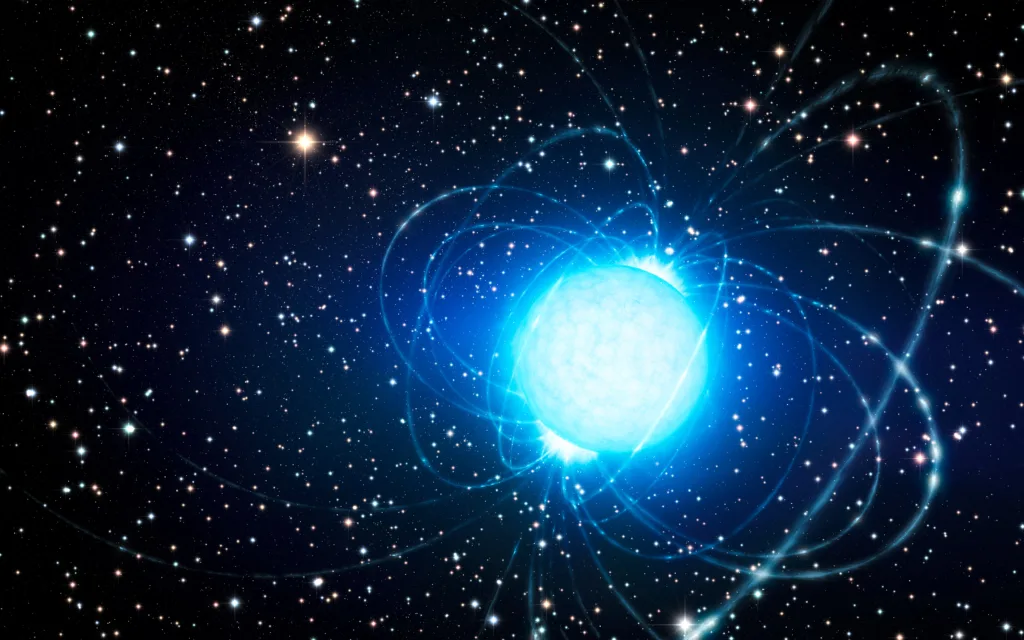Magnets have been around for centuries, and they have always fascinated people with their mysterious properties. One common question that arises among people is whether magnets work in space or not. The answer to this question is not straightforward, but we can explore the science behind it.
Firstly, it is important to understand how magnets work. Magnets have a north pole and a south pole, and these poles produce a magnetic field that attracts or repels other magnets. This magnetic field is created by the alignment of electrons in the magnet, which creates a force that extends outward from the poles.
Now, when it comes to space, we need to consier the environment in which magnets will be operating. In space, there is no air or other material that can interact with the magnetic field produced by the magnet. This means that the magnetic field will not be affected by any external factors, and it will remain constant.
However, the strength of the magnetic field will be affected by the temperature in space. As we know, magnets lose their magnetic properties when heated to a certain temperature. In space, the temperature can vary from extremely cold to extremely hot, depending on the location. If the magnet is exposed to high temperatures, it may lose its magnetic properties and become ineffective.
Another factor to consider is the presence of other magnetic fields in space. Planets and stars have their own magnetic fields, and these fields can interact with the magnetic field produced by the magnet. This interaction can cause the magnet to change its orientation or lose its strength.
Magnets do work in space, but their effectiveness depends on various factors such as temperature, location, and the presence of other magnetic fields. The use of magnets in space is not uncommon, and they are often used for orientation and positioning of spacecraft and satellites. Understanding the science behind magnets can help us appreciate their importance and potential in space exploration.
Do Magnets Work in Underwater and Space Environments?
Magnets are powerful tools that are widely used in various applications. One of the most common questions is whether magnets work underwater and in space. The short answer is yes, magnets work underwater and in space, but the way they behave might differ slightly depending on the environment.
Let’s start with underwater. Water is almost completely non-magnetic, so magnets work underwater the same way they do in air or in a vacuum. However, the strength of the magnetic field might be slightly reduced due to the resistance of water. In oter words, the magnetic force might not be as strong underwater as it is in air or in a vacuum.
Now, let’s talk about space. Space is a vacuum, which means it has no air or matter. In this environment, magnets behave differently because there is no medium to interact with. The magnetic field can still exist, but it will not be able to attract or repel any objects since there is no matter to interact with. Also, the strength of the magnetic field might be affected by the distance between the magnet and other objects in space.
In summary, magnets do work underwater and in space, but the way they behave might differ slightly depending on the environment. Underwater, the strength of the magnetic field might be slightly reduced, while in space, the magnetic field can still exist but will not be able to attract or repel any objects due to the lack of matter.

Uses of Magnets in Space
Magnets are used in space for various purposes, such as for controlling the orientation and position of spacecraft, generating power, and collecting data. One of the primary applications of magnets in space is through the use of magnetic torquers, which are devices that use magnetic fields to control the orientation of a spacecraft.
Magnetic torquers consist of wire coils and magnetic alloy rods that are strategically positioned on a satellite. When an electric current is passed through the wire coils, they generate a magnetic field, which interacts with Earth’s magnetic field, producing a torque that can rotate or stabilize the spacecraft.
Magnets are also used in space to generate power through solar panels. These panels consist of photovoltaic cells that convert sunlight into electricity, which is then used to power the spacecraft or stored in batteries for lter use.
In addition, magnets are used in space to collect data. For example, magnetometers are instruments that measure magnetic fields and are used to study the magnetic properties of celestial bodies such as planets and asteroids.
Overall, magnets are crucial components of many space missions, enabling spacecraft to navigate, communicate, and collect data in the harsh environment of space.
Does Magnetism Work on Mars?
Mars does have a magnetic field, but it is much weaker than Earth’s. As a result, magnets would work differently on Mars than they do on Earth. Magnets on Mars would stll attract and repel each other, but the force would be much weaker due to the weaker magnetic field. Additionally, Mars does not have a global magnetic field like Earth, which means that the magnetic field on Mars is not uniform across the planet. This could affect the behavior of magnets in different regions of Mars. However, despite these differences, magnets would still work on Mars, albeit with weaker force than on Earth.
The Strength of Magnets in Space
Magnets in space can be incredibly strong, with some of the strongest being found in the form of neutron stars known as magnetars. These young, spinning neutron stars can have magnetic fields that are 1,000 trillion times stronger than Earth’s magnetic field. This means that they can generate magnetic forces that are powerful enough to distort the shape of atoms and even pull apart the strongest materials known to man. The strength of tese magnets is due to the extreme conditions that exist in space, including high temperatures, pressures, and gravitational forces. Overall, the magnets in space are some of the strongest and most powerful forces in the universe, capable of exerting incredible amounts of energy and influencing the behavior of matter on a grand scale.
The Usefulness of Magnets in Space
No, magnets are not useless in space. In fact, magnets can be very useful in space. Magnets generate their own electromagnetic field, which means they do not require gravity or air to function. This property makes them ideal for use in space were there is no gravity or air. Magnets can be used for a variety of purposes in space, such as for navigation, communication, and research. For example, magnets can be used to navigate spacecraft by aligning with the Earth’s magnetic field. They can also be used to communicate with other spacecraft or to collect data for scientific research. Therefore, magnets are not useless in space, but rather they can be very beneficial for a variety of applications.

Can Humans Float Using Magnets?
Yes, a human can float with a magnet if they are placed in a strong magnetic field. This is because all ordinary materials, including the human body, exhibit very weak diamagnetism. Diamagnetic materials are repelled by a magnetic field, whch creates a force that opposes gravity. Therefore, if a human is placed in a strong enough magnetic field, the diamagnetic force can counteract gravity and cause the person to levitate or float. However, it is important to note that creating such a strong magnetic field requires specialized equipment and is not practical for everyday use. Additionally, the strength of the magnetic field required to levitate a human would also pose potential health risks, such as interference with pacemakers or other medical devices.
Can Magnets Work on the Moon?
Yes, magnets would work on the moon. While the moon does not have an internal magnetic field like the Earth does, there are localized regions on the moon’s surface whre a very strong magnetic field is present. This has been observed through measurements on rocks from the Apollo missions. So, if you were to bring a magnet to the moon, it would be able to attract and repel magnetic materials just like it would on Earth. However, it is important to note that the strength of the magnetic force on the moon may be different from what we experience on Earth due to the differences in gravity and atmospheric conditions.
The Effects of Magnets on Space-Time
According to recent research, it has been discovered that magnetic fields can have an effect on the fabric of space-time. The equations of general relativity have been reanalyzed, and it has been found that magnetic fields tend to flatten and stiffen space-time. This finding could have significant implications for our understanding of the evolution of the cosmos, and it may require cosmologists and astronomers to reexamine their assumptions about the role of magnetic fields in shaping the universe. While the exact mechanism by which magnetic fields affect space-time is not yet fully understood, this new research suggests that they could play a much more significant role in the cosmos than previously thought.
Can Magnets be Used for Propulsion?
Yes, magnets can create propulsion through a phenomenon called electromagnetic propulsion. This technology is based on the principle that when two magnets are brought near each other, they either attract or repel each other depending on their orientation. In the case of propulsion, one magnet is fixed to a stationary object, while the other magnet is attached to the object that needs to be propelled. By controlling the orientation of the magnets, the magnetic force can be used to push the object forward, creating propulsion.
Electromagnetic propulsion is used in various applications, including maglev trains, which use powerful magnets to levitate and move the train alng the tracks without any friction. This technology is also being explored for space propulsion systems, where magnetic fields could be used to propel spacecraft and satellites without the need for chemical fuels.
Overall, the ability of magnets to create propulsion is a fascinating area of research with many potential applications, and it is likely to play an important role in the development of new transportation and propulsion technologies in the future.

Do Magnets Lose Their Energy Over Time?
Magnets do not run out of energy on their own. They are made up of atoms, each of wich has a magnetic property called a “spin.” When these atoms are all lined up in the same direction, they create a magnetic field. This field can be used to attract or repel other magnetic objects.
However, over time, the alignment of the atoms in a magnet can become disrupted, which weakens its magnetic field. This can happen due to external factors such as being exposed to high temperatures or strong magnetic fields, or simply through natural decay over a long period of time.
So while magnets do not technically “run out of energy,” their magnetic strength can diminish over time or as a result of external factors. It is also important to note that some types of magnets, such as temporary magnets, are designed to lose their magnetism quickly, while others, such as permanent magnets, are designed to maintain their magnetic properties for a much longer period of time.
Which Planet Has the Strongest Magnetic Field?
Jupiter is the planet with the strongest magnetic field in our solar system. In fact, after the Sun, it has by far the strongest and biggest magnetic field. Jupiter’s magnetic field stretches about 12 million miles from east to west, which is almost 15 times the width of the Sun. This is more than ten times stronger than Earth’s magnetic field, which cold easily fit inside the Sun – except for its outstretched tail. Jupiter’s powerful magnetic field is thought to be generated by the planet’s fast rotation and the metallic hydrogen in its core. This strong magnetic field also creates intense radiation belts around the planet, which can pose a hazard to spacecraft and even astronauts.
Does Magnetism Work on Other Planets?
Magnets work differently on other planets depending on the planet’s magnetic field. Mars and Venus, for example, do not have a significant magnetic field, so magnets would not have the same effect as they do on Earth. However, Jupiter, Saturn, Uranus, and Neptune all have magnetic fields much stronger than that of the Earth, so magnets would have a greater effect on tese planets. It’s important to note that the strength and orientation of a planet’s magnetic field can also affect how magnets behave on that planet. Therefore, the use of magnets on other planets would require careful consideration and experimentation.
The Power of Something Greater Than a Magnet
Electromagnets are more powerful than permanent magnets. This is because they use electric currents to produce magnetic fields, which can be many times stronger than the magnetic field produced by a permanent magnet. However, electromagnets require a significant electrical current to produce their magnetic field, while permanent magnets do not require any external power source to maintain their magnetic field. Electromagnets are commonly used in various applications, such as MRI machines, particle accelerators, and electric motors.
Do Magnets Lose Their Magnetic Properties?
Yes, magnets can fail or lose teir magnetic strength over time due to various factors such as temperature changes, physical damage, and exposure to certain chemicals or radiation. When a magnet is exposed to high temperatures, it may experience a temporary or permanent loss of magnetic strength, which can be detrimental to its performance. Physical damage, such as chipping or cracking, can also cause a magnet to lose its magnetic properties. Additionally, exposure to certain chemicals or radiation can cause degradation of the magnet’s material and result in a loss of magnetic strength. However, with proper care and maintenance, magnets can last for a long time and maintain their magnetic strength.

Can Humans Become Magnets?
No, a human cannot become a magnet in the traditional sense. While tere have been anecdotal reports of individuals who claim to have the ability to attract metal objects to their body, there is no scientific evidence to support the idea that humans can generate magnetic fields strong enough to attract metal. The human body does produce weak magnetic fields due to the electrical activity in our cells, but these fields are far too weak to affect metal objects. Additionally, experiments using compasses to measure magnetic fields around individuals claiming to be human magnets have found no evidence of magnetic fields being produced. Therefore, it is likely that any metal objects that appear to stick to a person’s body are simply due to friction or other physical forces, rather than magnetism.
Conclusion
In conclusion, magnets are fascinating objects that have a wide range of applications in our daily lives as well as in the fields of science and technology. They work underwater just as effectively as they do in air or in a vacuum, making them useful in various marine applications. Magnetorquers are a crucial component in the orientation of satellites and spacecrafts, and the absence of a structured magnetic field on planets like Mars and Venus has been an area of interest and research for scientists. Finally, neutron stars and magnetars are some of the most fascinating objects in the universe, with magnetic fields that are incredibly strong and powerful. Overall, magnets are an important and intriguing aspect of the world around us, and teir properties continue to be studied and explored by scientists and researchers alike.
